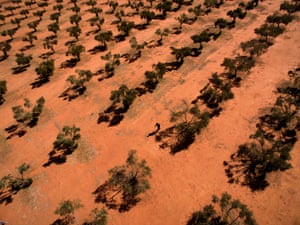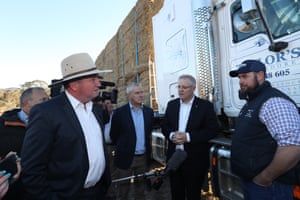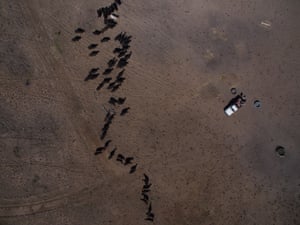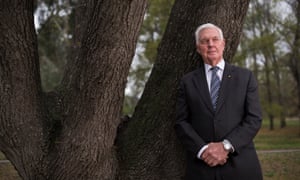Extract from The Guardian
Former governor general Michael Jeffery says soil health and regenerative farming is essential for security and carbon emissions
From the red soil of his hometown in the Western Australian outback town of Wiluna, Michael Jeffery very nearly became a farmer.
He opted for being a soldier instead, serving in Malaya, Borneo and Vietnam, where he was awarded the Military Cross and the South Vietnamese Cross of Gallantry. After a distinguished military career, he served as governor of his home state of Western Australia and governor general of Australia – who represents the Queen, Australia’s head of state.
So he doesn’t enter public debate lightly. But he is highly exercised by his latest topic: restoring Australia’s ancient soils.
It was a world first when he was appointed by Julia Gillard’s Labor government as the first national soil advocate in 2012 and his term was extended under the former National party leader and agriculture minister, Barnaby Joyce. Since then he has consulted with thousands of farmers, Indigenous land managers, policy makers, students and interest groups across the country.
It has taken six years but now he has a very simple message for politicians in his report, Restore the Soil: Prosper the Nation. Australia’s soil, water and vegetation should be declared national strategic assets.
“The emerging concept of ‘soil security’ also underpins the world’s six existential challenges: food, water and energy security, climate change abatement, biodiversity protection and human health,” he wrote to the prime minister’s office.
“I believe that soil and water security will increasingly underpin global social stability and security.”
Some of the recommendations could be controversial for many of Australia’s conventional farmers.
For example, Jeffery has urged governments to support farmers to embrace regenerative farming and cut back on agricultural chemical and non-organic fertiliser usage. He believes improving soil health could help draw down carbon to neutralise Australia’s emissions. He wants to see properly funded agricultural education for Australia’s farmers and agronomists as well as soil and water scientists – independent from companies with vested interests. He also wants farmers to be paid a fair price for food.
"If we doubled exports, we could feed 60 to 80 million people, but if we exported knowledge, we might feed a billion."
“It’s a no-brainer, there should be no political dissension at all,” Jeffery tells Guardian Australia. “Who is going to knock restoring agricultural landscapes? It’s about what comes out of the soil, like clean water, all our food, timber and fibre at a time when the planet, due to over population and bad agricultural methods is destroying it hand over fist.”
Jeffery says improving soil health has the potential to neutralise Australia’s annual emissions of 600m tonnes of CO2 and would allow a more orderly transition to renewable energy sources.
“The real fact is undeniable, our country [has] continued to lose carbon due to poor soil and water management,” Jeffery says.
“If we don’t go to regenerative agriculture, we will continue to mine soils, particularly of carbon. This is the great loss and it is not being admitted. If you continue to mine carbon, you are shot.
“It’s not the total measurement of soil health but it’s a good indicator and it facilitates the retention of water in soil – 50% of our rain is not getting into the soil and that is causing so much of the problem.”

He opted for being a soldier instead, serving in Malaya, Borneo and Vietnam, where he was awarded the Military Cross and the South Vietnamese Cross of Gallantry. After a distinguished military career, he served as governor of his home state of Western Australia and governor general of Australia – who represents the Queen, Australia’s head of state.
So he doesn’t enter public debate lightly. But he is highly exercised by his latest topic: restoring Australia’s ancient soils.
It was a world first when he was appointed by Julia Gillard’s Labor government as the first national soil advocate in 2012 and his term was extended under the former National party leader and agriculture minister, Barnaby Joyce. Since then he has consulted with thousands of farmers, Indigenous land managers, policy makers, students and interest groups across the country.
It has taken six years but now he has a very simple message for politicians in his report, Restore the Soil: Prosper the Nation. Australia’s soil, water and vegetation should be declared national strategic assets.
“The emerging concept of ‘soil security’ also underpins the world’s six existential challenges: food, water and energy security, climate change abatement, biodiversity protection and human health,” he wrote to the prime minister’s office.
“I believe that soil and water security will increasingly underpin global social stability and security.”
Some of the recommendations could be controversial for many of Australia’s conventional farmers.
For example, Jeffery has urged governments to support farmers to embrace regenerative farming and cut back on agricultural chemical and non-organic fertiliser usage. He believes improving soil health could help draw down carbon to neutralise Australia’s emissions. He wants to see properly funded agricultural education for Australia’s farmers and agronomists as well as soil and water scientists – independent from companies with vested interests. He also wants farmers to be paid a fair price for food.
"If we doubled exports, we could feed 60 to 80 million people, but if we exported knowledge, we might feed a billion."
“It’s a no-brainer, there should be no political dissension at all,” Jeffery tells Guardian Australia. “Who is going to knock restoring agricultural landscapes? It’s about what comes out of the soil, like clean water, all our food, timber and fibre at a time when the planet, due to over population and bad agricultural methods is destroying it hand over fist.”
Jeffery says improving soil health has the potential to neutralise Australia’s annual emissions of 600m tonnes of CO2 and would allow a more orderly transition to renewable energy sources.
“The real fact is undeniable, our country [has] continued to lose carbon due to poor soil and water management,” Jeffery says.
“If we don’t go to regenerative agriculture, we will continue to mine soils, particularly of carbon. This is the great loss and it is not being admitted. If you continue to mine carbon, you are shot.
“It’s not the total measurement of soil health but it’s a good indicator and it facilitates the retention of water in soil – 50% of our rain is not getting into the soil and that is causing so much of the problem.”

“If we get agriculture right, we could pull down as much carbon as we are emitting.”
Jeffery’s intervention comes as the Intergovernmental Panel on Climate Change (IPCC) warned that half a degree of extra warming will affect hundreds of millions of people and called for a transition out of coal power by 2050.
Jeffery’s policy calls for “reducing or ceasing synthetic chemical inputs” as debate rages in Australia around the use of the common weed killer glyphosate following a US ruling which found it caused the cancer of a terminally ill man.
The president of the National Farmers Federation, Fiona Simson, says glyphosate had allowed farmers to embrace minimum tillage cropping systems, which she described as “one of the greatest advancements in agricultural sustainability in recent decades”.
Simson says more than 800 scientific studies and reviews, including numerous independent regulatory safety assessments, have affirmed glyphosate is safe and does not cause cancer. She said the product had also been approved for use by every regulator across the world including the Australian Pesticides and Veterinary Medicines Authority since 1974.

But Jeffery says the debate over glyphosate, sold under brand names such as Round Up, reflect the need for independent government-funded research and education.
“We need independent research separate to that conducted by chemical companies. That’s why you need government-run research stations, in my opinion, with properly trained agricultural scientists,” he says. “We ought to know if it is good, bad, indifferent, OK in little bits.”
“If it is causing problems and people are being dishonest then there should be all hell to pay. It is a little like the banks doing things improperly while knowing it. I suspect, in part, if there are companies who do this, they may have to be held accountable for what they have done.”
Jeffery also urges consumers and major supermarket chains such as Coles and Woolworths to accept that farmers need to be paid a fair price for food. He described $1 a litre milk as “patently stupid”.
“A builder or a plumber or a doctor doesn’t get paid like farmers,” he says. “When Coles says we are driving prices down, in some cases what it does mean is they are helping drive farmers to bankruptcy.”

As the drought bites harder in the eastern Australian states, Jeffery says the combined effects of climate change, water mismanagement and land degradation means that looking after Australia’s agricultural soils is essential for the nation’s security.
They include a national soils policy with a permanent soil advocate, better education for farmers and agricultural scientists, a mandated school garden program and syllabus, funding for case studies in regenerative agriculture, funding for regenerative farm works via Landcare and an annual report on the global state of soil, water and food from an Australian perspective.
The policy defines regenerative agriculture as “the application of techniques which seek to restore landscape function and deliver outcomes that include sustainable production”. This could include using more organic composts and fertilisers, slowing the flow of water, fencing off waterways from stock, cell grazing, feral animal control and direct-drilling crops into pasture.
Jeffery said support could come in the form of tax deductions for regenerative farmers or the government part-funding regenerative work.

“The object is to convince the average conventional farmer to change without being frightened, to show how you can go through a regenerative process and still be economically viable,” Jeffery says.
“Farmers can’t do this by themselves, they need the support of government and the public to be the cleanest and greenest they can be.”
He said current education programs available were “generally not satisfactory”. The policy states “there is a dearth of information in many areas, and product placement information only in others. Often the advice given is contradictory to best practice or considered by many farmers to be out of date.”
Jeffery said government funded research stations were “stressed and stretched” when there needed to be more fully staffed stations where farmers could access the best advice from agronomists, water scientists and soil scientists “who are properly trained”.
“That’s part of the problem, for example, the agronomists are often owned by a chemical company, so of course they are going to say you need more of our product.”
While elements of regenerative farming have been practised in Australia for decades, it has recently gained more mainstream attention, partly due to the work of Australian scientist and farmer Charlie Massy, who has been critical of “industrial agriculture”.
Jeffery said while farming practices have changed over the years, he would like to see a stocktake of farming methods.
“I do not criticise industrial agriculture per se because it helped to make Australia a wealthy country,” he said. “[Farmers] did what they had to do at the time with the education they had.”
With better agricultural education, Jeffery believes Australia should play a leading role in showing the rest of the world how to manage inherently infertile soils in a difficult climate while building land management knowledge to export along with food.
“If we doubled our exports tomorrow, we could feed 60 to 80 million people, but if we exported knowledge, we might help to build feed a billion people,” he says.
At 80, his passion for the project is clear.
“I was always interested in farming and nearly became a farmer, but I think about our 10 grandchildren, whose lives I’m concerned about in that sense, and their parents and all our children.”

No comments:
Post a Comment